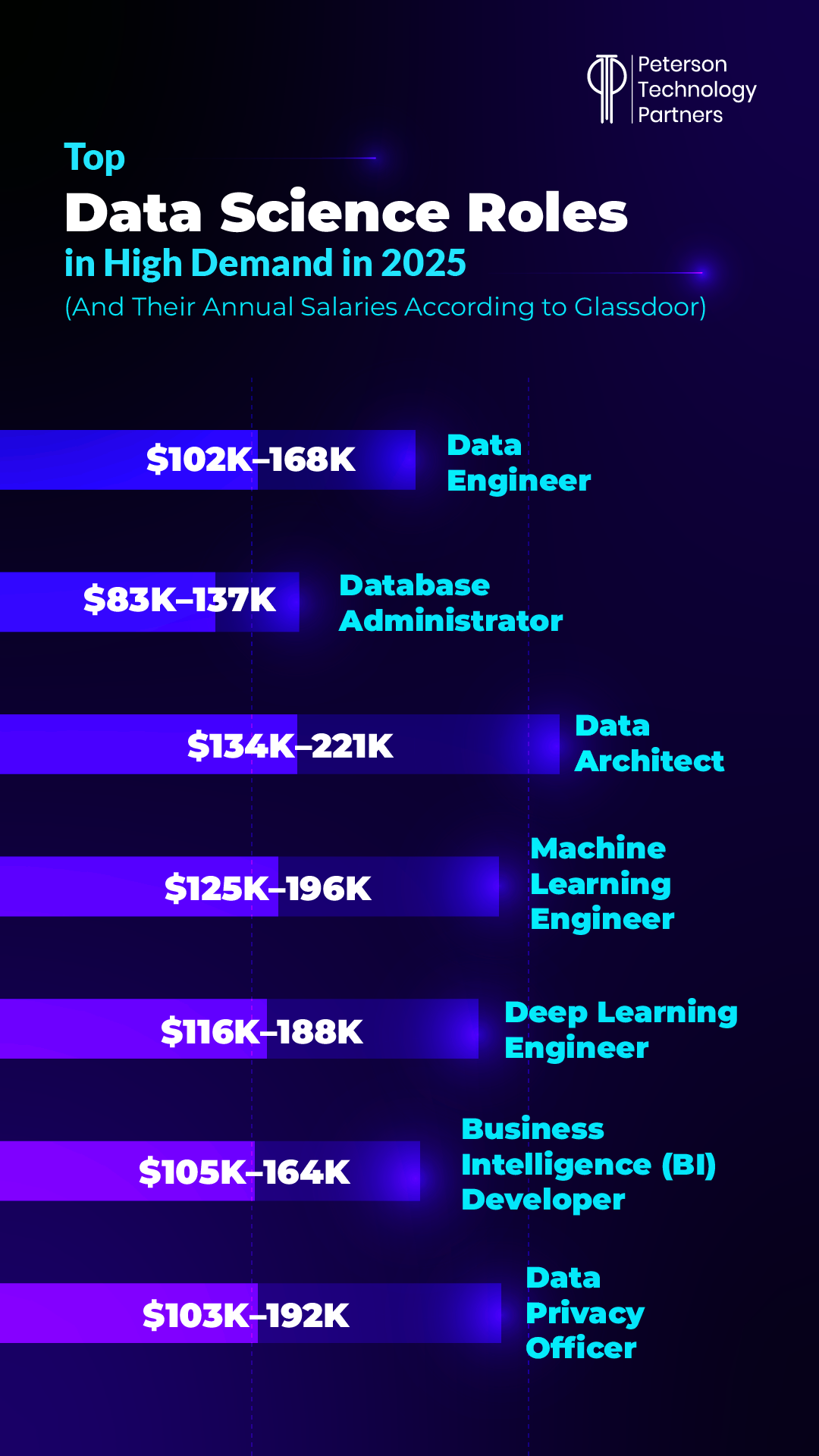Introduction
Amid the rise of AI and its drastic impact on jobs, data science is among the top IT functions expected to persist. We can’t have AI without data, after all.
The future of data science remains strong. In fact, the World Economic Forum forecasts that, while AI and data processing trends will replace about nine million jobs, it will also create 11 million new jobs by 2030—a significant gain overall.
Further, the US Bureau of Labor Statistics projects that data science roles are projected to grow by 36% from 2023 to 2033, a much higher rate than the average of all occupations.
But which in-demand data science roles are right for you? Keep reading to learn about our top picks.

1. Data Engineer
We know that data scientists analyze data to reveal insights for businesses, but it’s data engineers who make sure the data is optimized for this purpose—working behind the scenes to ensure it is collected and stored in a way that is accessible to data scientists and analysts.
To land a job as a data engineer, you’ll need coding expertise in languages such as Python, Java, or Scala, along with proficiency in SQL and NoSQL databases, CI/CD pipeline implementation, and cloud infrastructure.
Average data engineer salary: $102K–$168K/yr (Glassdoor)
2. Database Administrator
For businesses to get the most out of their data, they need experts to manage databases for seamless and secure operation. This responsibility doesn’t go to data scientists and analysts but rather database administrators (DBAs).
Additional database administrator job responsibilities include regular fine-tuning of data storage, retrieval, and performance optimization—along with overseeing database backup, recovery, and security protocols.
Average database administrator salary: $83K–$137K/yr (Glassdoor)
3. Data Architect
Data architects focus on the big picture, collaborating with senior stakeholders, IT teams, and data professionals to ensure alignment between data infrastructure and long-term business goals. They also manage regulatory requirements for data use across the organization.
Data architects require experience with relational and dimensional data modeling, data warehousing solutions, and big data and cloud technologies. They also need to be able to align analytical abilities with business needs.
Average data architect salary: $134K–$221K/yr (Glassdoor)
4. Machine Learning Engineer
The goal of a machine learning engineer is to create efficient, self-learning applications. They leverage expertise in statistics, programming, and data science to develop AI solutions that drive business outcomes.
Necessary machine learning engineer skills include proficiency in programming languages like Python and C++, popular machine learning frameworks like TensorFlow and PyTorch, and familiarity with cloud platforms that support ML operations.
Average machine learning engineer salary: $125K–$196K/yr (Glassdoor)
5. Deep Learning Engineer
If you’re on the hunt for fast-growing tech jobs in data science, you may want to explore the world of deep learning.
While machine learning is best suited for well-defined tasks using structured data, deep learning works best for complex jobs that involve making sense of unstructured data. To achieve this, deep learning engineers make use of neural network architectures.
They also need to be proficient in coding with Python and using deep learning tools like PyTorch and TensorFlow.
Average deep learning engineer salary: $116K–$188K/yr (Glassdoor)
6. Business Intelligence Developer
IT professionals with business acumen are in increasing demand, as technological developments are proving insufficiently effective when they cannot be directly tied to business outcomes.
Business intelligence (BI) developers take historical data and design sophisticated yet accessible data models that help those in charge make the best business decisions possible.
BI developers will, of course, require proficiency in BI tools such as Power BI, Tableau, or QlikSense, along with SQL and database management.
Average business intelligence developer salary: $105K–$164K/yr (Glassdoor)
7. Data Privacy Officer
More and more businesses are prioritizing data compliance as a means to protect customer data, build trust, and maintain their company’s reputation. Data privacy officers (DPOs) maintain current knowledge on data regulations, translating complex laws into digestible, actionable standards for organizations to follow.
While technical skills are required to help implement data guardrails, data privacy officers mostly need soft skills like strong communication ability to accessibly explain regulations across organizations.
Average data privacy officer salary: $103K–$192K/yr (Glassdoor)
Conclusion
With the right skills, qualifications, and mindset, you can grow your data science career alongside the technology transforming the field.
If any of these high demand data science jobs speak to you, be sure to check PTP’s job board for an opportunity to work with top companies across the country!
FAQs
What are the highest paying data science roles?
The highest paying data science roles include machine learning engineer ($125K–196K/year), deep learning engineer ($116K–188K/year), and data architect ($134K–221K/year).
What is a data architect vs data engineer?
While data architects create a vision for data frameworks or processes, a data engineer uses this vision to create a physical framework. As a result, a data architect mainly focuses on data modeling and integration, while a data engineer focuses more on software.
What is a typical machine learning engineer career path?
A bachelor’s degree in computer science or a related field is standard for machine learning engineers. For entry-level work, machine learning engineers typically start in roles like computer engineer, data scientist, software developer, and software engineer. To build machine learning expertise, there are certifications like IBM Machine Learning Professional Certificate and Stanford and DeepLearning.AI’s Machine Learning Specialization.





